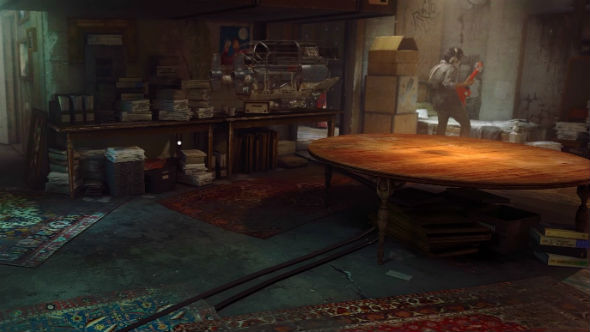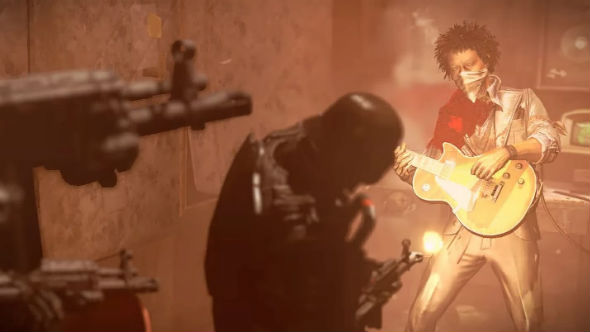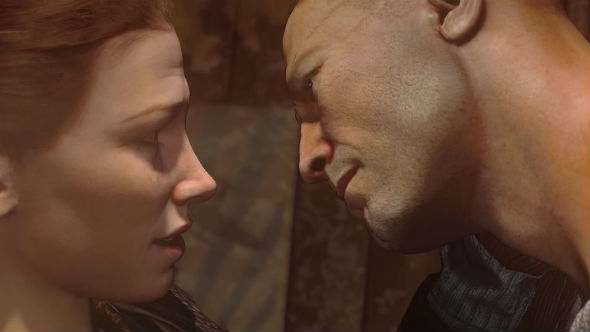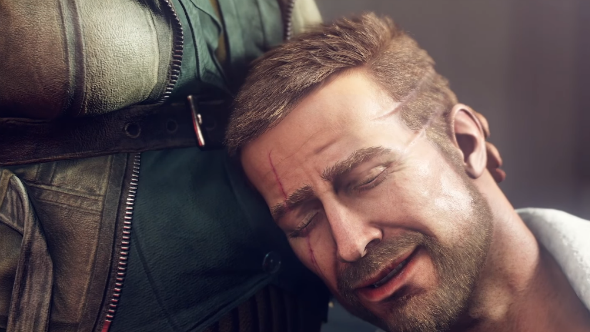The New Order may well refer to the Nazi regime which, by 1960 in Wolfenstein’s alternate history, has conquered the world. But it could equally be in reference to the small, underground resistance movement in which the player fights, gradually peeling away layers of the old dictatorship, battle by battle.
They may not be about free love, but ammo still comes cheap in the PC’s best FPS games.
Patently, The New Order is about rebellion. Be it a prison, a party headquarters, or a base on the Moon, almost every mission is about surging into a government building and tearing it apart – when in the climax we face General Deathshead, who wears a suit of armour electrically charged by lightning, we are very literally fighting the power.
Our rebellion, however, extends beyond extricating Nazi heads from shoulders. A collectible newspaper clipping, which explains how a pop foursome from Liverpool, “Die Käfer,” have been forced to start singing in German, illustrates that music and expression are being cautiously suppressed by the Regime. The same clipping, which also notes the band lace their songs with anti-government messages, stresses how culture and non-violent rebellion are used to attack the established order.
When I think of the 1960s a lot of things spring to mind. Most prominent, however, are the Woodstock music festival and the Free Love movement. To put it more bluntly: when I think of the Sixties I think of Jimi Hendrix and people having sex. Not only are both represented in The New Order, they appear as small, but vital, symbols of rebellion.

J, Wolfenstein’s bandana-wearing, American guitar wizard is an obvious caricature of Hendrix. Barely speaking and almost perpetually connected to his headphones, he’s totally apart from the rest of the world. While the Resistance makes its battle plans, J is normally visible in the corner of the room, scrupulously shredding his axe.
Physically, he’s an individual, standing removed even from the organisation that seeks to destroy organisation. Spiritually, he’s also a free agent: when our protagonist, William “B.J.” Blazkowicz, tells him to run and hide from the Nazis storming the base, J says no; he’s going to make a stand. Although it means dying, J stays behind, to do exactly what he wants.
In his final moments, Wolfenstein stresses the power of J’s iconoclasm. When he stands before them, wielding his six string, the soldiers about to shoot J panic that he’s holding “some kind of weapon.” However, he doesn’t defeat them by physically fighting back. Via the network of loudspeakers that he’s hooked up throughout Berlin – which he uses to transmit his searing version of the Star Spangled Banner, performed in our own timeline at Woodstock – J uses the power of his free expression to literally rattle the regime’s heart.

He resembles a specific man, but J’s covered face and single initial also make him a generic figure, personifying the essence of counter-culture – independent, steadfast, and using music instead of bullets, he encapsulates the protests that helped define the spirit of the Sixties.
As for Free Love, when B.J. and Anya discretely sleep together on a Nazi-controlled train, he describes its power very straightforwardly: “Sometimes Christmas. Sometimes birthdays. Sometimes mayhem, suffering, and death. Sometimes you just need to feel something good.” Directly surrounded by it – the loathsome Frau Engel is only a carriage away – B.J. and Anya’s lovemaking becomes a way to punch through the dictatorship and the misery it spreads.
The Nazi propaganda posters, which litter The New Order, insist on service to the regime. Any acts of non-conformism, people living freely and doing what they like, should be reported to the police: we later overhear a woman, informing on the boy who lives across her street because she saw him trying on makeup.

So, B.J. and Anya’s encounter becomes a small act of rebellion. Contrary to the Nazis, who assert everything everyone does should be with Nazism in mind, B.J. and Anya are thinking only of one another. Right beneath the nose of a regime which says you should only do as you’re told, they are doing what they both deeply, passionately want.
We see the Nazis try to dehumanise people. They kidnap patients from a hospital near the beginning of the game (“like it’s their personal candy shop,” B.J. remarks) to be taken away and experimented on. In Eichenwald prison, inmates are made to wear masks which completely cover their faces. Some soldiers are surgically implanted with robotic parts to make them more machine-like. At the Belica concentration camp, people are murdered, en masse.
In amongst all this horror, B.J. and Anya’s love is uniquely human. In a world trying to strip people of their identity, they maintain something that is emotional and specific to them. Implying he fights with her in mind, B.J. and Anya get together again right before he departs to successfully capture a Nazi submarine. Like the Human Be-In in San Francisco, which closely preceded 1967’s Summer of Love, and focused on personal empowerment and changing the world with compassion, B.J. and Anya’s lovemaking is depicted as giving them strength and purpose.

It goes against the established, Nazi rule, that says things can only improve if people become less like people. The more time they spend together, the more B.J. and Anya fight to change their world – in some of his lowest moments, it is B.J’s fantasy about living with Anya and their two imagined, happy children that emboldens him to keep going.
A similar spirit of the Sixties seems to be alive in forthcoming sequel The New Colossus. Stressing the role of counter-culture in opposing established rule, the mainstream is depicted as plain untrustworthy. In The New Colossus’ first trailer, television game shows and popular serials like Lassie have become outright propaganda. American national holidays are where Nazis rub shoulders with the Ku Klux Klan. And it’s only the Resistance, who drop acid and play jazz clarinet, who can stop them.
Moreover, love is still fighting to prevail. If the Nazis envision a world exclusively for people like themselves, Anya and B.J., who are expecting a baby – which we can safely assume will be raised in a non-Nazi tradition – are rebelling simply by clinging on to their relationship and starting a family. There are still guns, axes (not of the J kind), and lots of blood. But The New Colossus seems mindful of other kinds of rebellion. It appears to stress, like its predecessor, that there are other ways to fight the power – surely the most enduring aspect of the 1960s.
